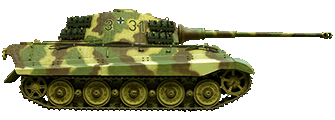
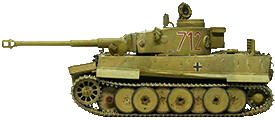


In 2004, After placing some photos here of the jack I found in La Gleize, Per Sonnervik (†) contacted me, pointing out that there was more than one jack type used.
First he showed me some photo's of different types mainly used on Tigers and Panthers, so I got an idea of what was used.
Then he started bombing me with all kind of exceptions he found. At that point I wasn't able anymore to understand what belonged where.
That is where I got the idea of making an identification table for those jacks.
In the mean time, Per bought a 20T jack that I found for sale and allowed me to take it's dimensions before transporting it to Sweden. The resulting drawings, combined with the "La Gleize" museum photos give a good idea how these 20-tonnes jacks functioned and what they look like.
This story continues in 2007 when I was planning a visit to the Saumur Musée des Blindées and was contacted by the late Ronald Horton to collect a 20TL jack for him. Then I could take it's dimensions and photos. The trip became even more rewarding when I found a rare 15T jack in the Saumur Museum!
It is certain that there are more jack types than the ones mentioned below. Here we only show jack types seen on Panthers and Tigers.
10T?
- We don't have much on this one. Per thought it is probably a 10 ton capacity jack as it looks like the one used on lighter tanks such as the Panzer III and Panzer IV and their variants.
The jack is seen on many Tiger1 line drawings in books (not original drawings), but we found no photo evidence that this jack was really used here. In fact, if it really is a 10T jack, it would be highly unlikely that it was used on heavy tanks like the Tiger1.
These jacks distinguish themselves clearly from other types by the use of bolts in the body, allowing it to be opened for maintenance.
This jack type seems to be almost unchanged made and in use today in the 1.5T to 20T range. However, we don't know if the range was this complete in WWII.
You can find some modern examples here:
Jack 10T
15T
- This is a confirmed 15 ton capacity jack. Per found many photos of it. We think it is the 15T jack the books mention to be used on Tiger1, until it was replaced by the sturdier 20TL version. This is also the type mainly used on Panthers, until it was replaced by the 20TL version.
Jack 15T
20TL
- This is the 20 ton capacity version used on the Tigers. To prevent confusion, we added the "L" - long body - in the name, to prevent it being mistaken with the "S" version.
Jack 20TL
20T
- This is the same 20 ton capacity jack, but here the "S" stands for short body version. There are some advantages compared with the "L" version:
The length is reduced, while it's lifting range remains the same, probably saving a lot of weight, making it better to handle. (Per's jack weighs 60,5Kg. The long version should be around 70Kg)
There is a completely different foot, allowing a more minimized length.
So far we have seen this jack with a crowned top like Per's and a flat top such as in the one in La Gleize.
Jack 20ts
At this point, I think it is necessary to quote Per saying "With these jacks, anything goes!" It means that this table is only to be used as a basic guide. We have seen some photos showing exceptions to the rule. It looks like when a jack was lost or damaged, it could be replaced with anything at hand. Therefore we strongly advise you to check the jack type on the vehicle you want to model with photos if possible.
In the table below I don't show the swing arms and handle bars to keep a clear view on the jacks. Most jacks are seen with both fixed- and adjustable swing arms and handle bars. However, the 15T jack is only seen with these fixed.
| 10T | 15T | 20TL - (long) | 20TS - (short) | |
|---|---|---|---|---|
|
Total view |
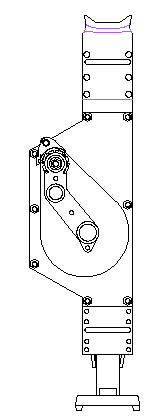 |
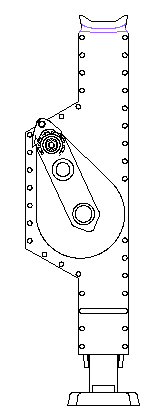 |
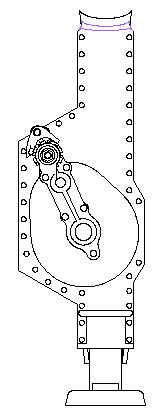 |
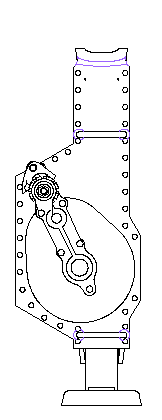 |
|
Mainly Used: |
Panzer III Panzer IV |
Tiger 1 Panther |
Tiger I late Tiger II |
Panther |
| Also used on: |
Panther Tiger I? (no evidence) |
Panther | Tiger II | |
| Top shape |
 Straight Pointed Crown |
 Straight Pointed Crown |
 Pointed Crown |
 Crown Top or Flat top |
| Bottom plate shape |
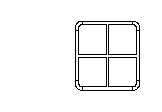 Square Ribbed |
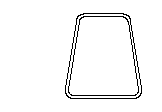 Trapezium |
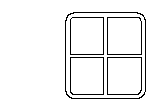 Square Ribbed |
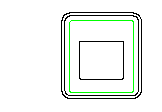 Square Lowered |
| Body |
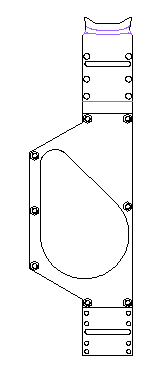 8 Bolts in body Rivets visible on the other side |
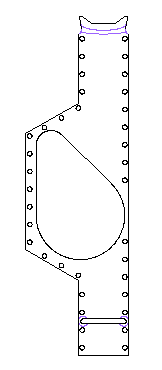 Gear case centered Rivets in straight line |
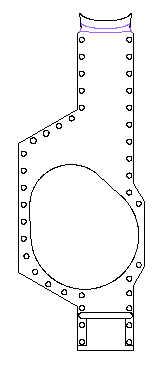 Extended Gear case Grip strength plates Curved Rivet Line |
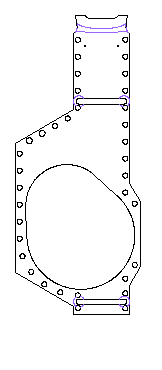 Extended Gear case Shortened Body |
| Axle plate |
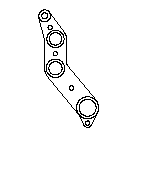 Nodded axle plate Gear case around 3 axles |
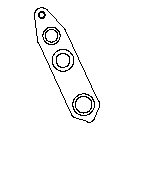 Straight axle plate Gear case around 3 axles No rivets |
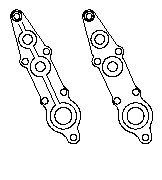 Straight axle plate Gear case around 2 axles Seen with and without rib |
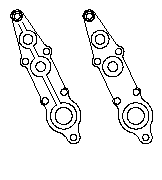 Straight axle plate Gear case around 2 axles Seen with and without rib |
|
10T - As said before: We don't have much on this one. There are no dimensions available, so these sketches are the result of studying and comparing photos. The rivet and bolt positions should be reasonably accurate, but we have no photo showing the "L" shape lifter at the lower end of the body, so this may look completely different. |
10T |
10T |
|---|---|---|
|
Main characteristics of this jack are: - The gear case is just below the middle of the body and probably, it can be opened for maintenance. - On the thin square ribbed foot, there are four protuberances. - The rivets at the top and bottom of the body have a different diameter. - The "Grips" are stuck through holes, then welded on the back side. - The swing arm (Not shown in the drawings.) is made of one piece. - The swing arm handle is foldable. |
 |
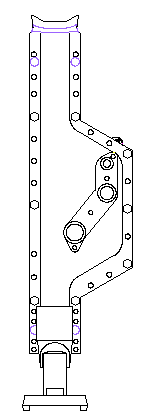 |
|
15T - Here also: There are no dimensions available, so the accuracy is about the same as with the 10T. |
15T Front |
15T |
|---|---|---|
|
Main characteristics of this jack are: - The gear case is placed in the middle of the body. - The rivets on the lower side of the gear case are placed in a straight line. - The foot is trapezium shaped, without ribs. - The front side has a symmetric relatively wide axles plate without visible rivets. - The back side has an asymmetric axles plate, which is riveted, but has no rivet extensions. - The "Grip" is stuck through holes, then welded on the back side. - The swing arm (Not shown in the drawings.) is made of one piece. - The swing arm handle is not foldable. |
 |
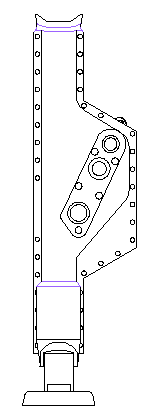 |
|
20TL main differences with the other jacks are: - A pointed crown top. - The gear case is placed a little below the middle and is extended to the right side. |
|||
Tigers |
Panther |
Ferdinand |
Back |
|---|---|---|---|
 |
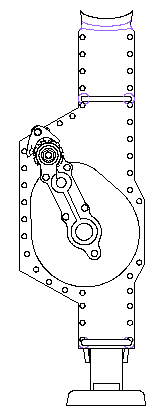 |
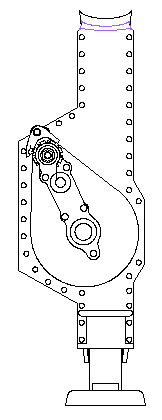 |
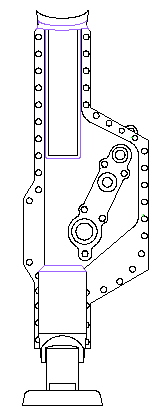 |
|
20TL - Tigers: - This jack has only one "L" shaped grip, which is riveted to the body - The square foot is seen with a double rib or a single rib (see drawings on the right.) - The "drop" shaped gear housing fits around two axles. It's left vertical line is tilted a little to the left. |
 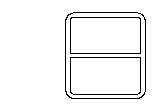 | ||
|
20TL - Panther: - This jack has two grips, in a different position than the Tigers version. Also the grips are welded directly to the body. | |||
|
20TL - Ferdinand: - The "drop" shaped gear housing fits around three axles. It's left vertical line is tilted a little to the right. - The position of the single grip is the same as on the Tigers version, but on the photos it was impossible to see how it was attached to the body. - On the photos we saw the foot placed in a square casing. | |||
|
20TS: Of this jack there are many photos and dimensioned drawings placed on this page: |
|||
Resources:
- "D.W. to Tiger1" by Jentz & Doyle
- "Der Panzer-Kampfwagen Tiger und seine Abarten" by Walter J. Spielberger & Hilary L. Doyle
- "December 1944" museum in La Gleize
- Panzer museum Munster
- Dimensions taken from Per Sonnervik's 20TS jack